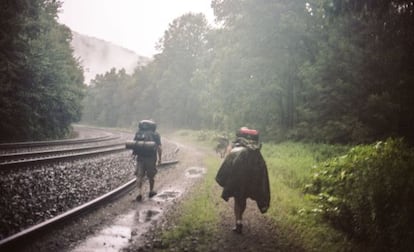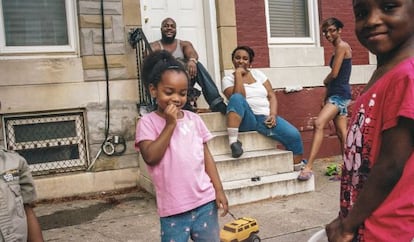The long march home
‘Perfect Storm’ author Sebastian Junger’s new film and book charts the walk across the US he undertook with two war veterans and a Spanish photographer


Four men walking — in winter and in summer, under the rain, in the snow, suffering excruciating cold and baking sun. They sleep wherever the end of the day catches them, bivouacking in the woods or in homeless shelters in the suburbs. They form a patrol, and all have experience of war — some have killed, all have seen others killed in battle. But they are not traveling through enemy territory and they are not on a combat mission. They are in the United States. Their often dirty and tired bodies exude memories, penance and a kind of redemption. The aim of their penitent trek, among other things, is to close wounds, observe the world and find their place in it. It is, at its core, a desperate attempt to return home.
The Last Patrol is the name of the new project by US writer, filmmaker and journalist Sebastian Junger, author of the bestselling The Perfect Storm — made into a 2000 film with George Clooney — as well as War (2010), based on his 15-month stay with a platoon of American soldiers in one of the worst theaters of war in Afghanistan. He also directed Restrepo, the Oscar-nominated documentary on the same subject.
Junger had no idea what would come out of his outlandish idea of walking across the United States accompanied by war veterans and a camera. “I and the guys I went with were fighting to get back from the war psychologically; it seemed nice to do it walking,” he says. Now the experience has spawned a book and a film, both titled The Lost Patrol. The former will be published in March, while the latter is set to premiere that same month in New York.
Together they made a series of treks in each of the different seasons until they covered the 482 kilometers between Washington D.C. and Pittsburgh. Accompanying Junger were two combat veterans, both with experience of serving on the front lines in Iraq and Afghanistan: special forces sergeant David Roels, 38, and infantryman Brendan O’Byrne, 29, one of the soldiers Junger followed in War.
They saw misery, marginalization, racism and religious fanaticism
The fourth member of the group was Guillermo Cervera, a Madrid-born photojournalist who has covered conflicts in Bosnia, Chad, Afghanistan and Libya. He explains how he came to be included in the project while drinking a chocolate milkshake in a bar in Barcelona: “I was with Sebastian Junger’s great friend and collaborator, British photographer Tim Hetherington, coauthor of Restrepo, when they killed him on April 20, 2011 in Misrata, in Libya, during a mortar attack by forces loyal to Gaddafi. The US photographer Chris Hondros died in the same attack and two other colleagues were injured. When Tim ended up hit I lifted him onto the back of a pickup, but he bled to death before we got to hospital. I was back in Spain, in Lanzarote taking surf photos, which is what I do between conflicts as a kind of therapy, when Sebastian called me to go to Tim’s funeral in New York and explain how he died to his relatives.”
It was then Junger explained his project to Cervera and asked him to take his friend’s place. “He told me he wanted to walk with them and take photos of the story; that he was also interested in getting the viewpoint of a foreigner.” Cervera, who comes from a military family, is going to publish a book of his extraordinary photos of the experience that will be sold alongside Junger’s.
“The initial idea was to go from Washington to New York, but Sebastian decided to go to Pittsburgh, remembering that it was in the Ohio Valley in 1754 where the Seven Years’ War began on American soil and where General Braddock died in combat fighting against the French and their Native American allies,” Cervera explains.
“On the journey we didn’t limit ourselves to talking about our own personal stories and our experiences of war, but also observed and commented on the far-from-rosy situation of the places we passed through, drawing something of a shocking and dark portrait of Obama’s America.”
They saw a lot of misery, a lot of marginalization, a lot of racism, a lot of hate, a lot of religious fanaticism. They talked to people to find out their opinions. “And all kinds of things happened to us.”

One time they were chased by the police, who even used a helicopter to follow them. On another occasion they ended up at a military airport at which the bodies of soldiers killed in Afghanistan were unloaded. “Sometimes it was like a dose of LSD, an acid trip. We went around with the homeless, we washed in the river, we saw a lot of animals in the woods, deer, foxes, raccoons, a bear.” Sometimes people received the walking veterans with compassion, other times with apprehension. Every night they lit a fire to cook on and made a bivouac. If it rained, they joined their military ponchos. They also took a dog along with them, Daisy.
“We talked a lot. Brendan had a troubled past. At the age of 16 he fought with his alcoholic father, who shot him twice with a rifle. To stop his old man from going to prison he said he acted in self-defense, which saw [Brendan] sent to reform school. Later he enlisted in the army and they sent him to Afghanistan.”
Junger confessed his obsession with war and his pain and feelings of guilt surrounding Hetherington’s death. Cervera talked about his father, an arms salesman with whom he has a difficult relationship. All shared the painful moments they experienced regarding war, the death of comrades, fear and the difficulty of coming back.
“The worst moment? The occasion one night when we saw a dog get run over. Each of us reacted in our own way. Brendan got very nervous, Dave started to laugh. We got tangled up in a debate about who was the most hung-up. We all were, each one with their own personal hang-ups. In reality all four of us had post-traumatic stress from the war. Four guys affected by the war, marked, in search of something undefined and peeping out of the heart of darkness of the American dream.”







































